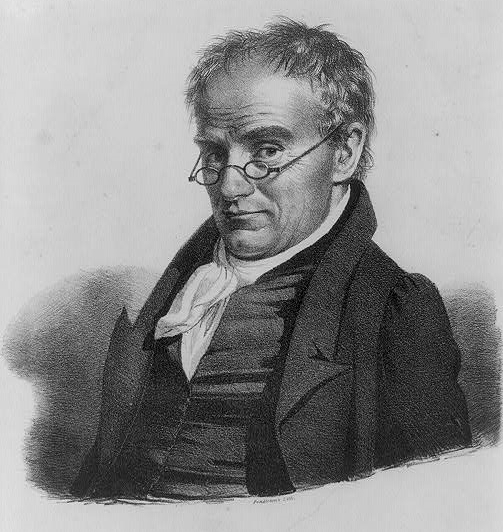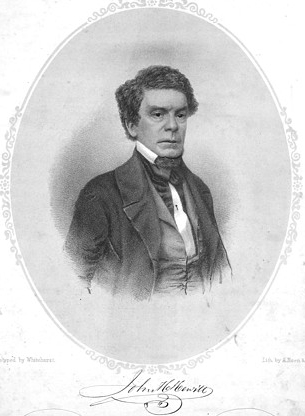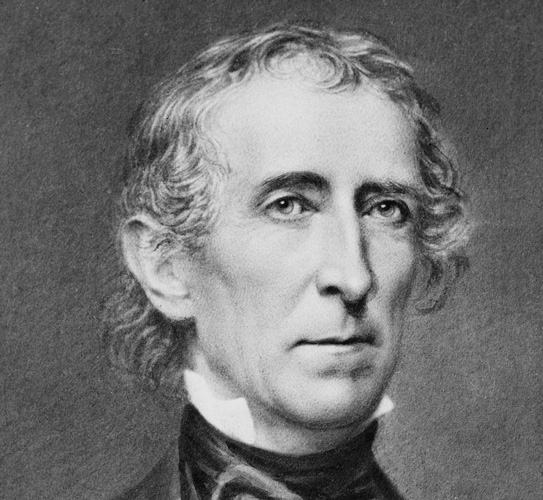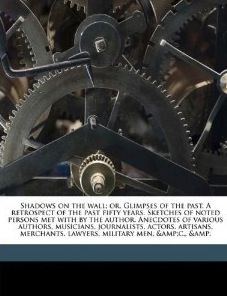Anthony Philip Heinrich: ‘de peeples vot made Yohn Tyler Bresident ought to be hung! He knows no more apout music than an oyshter!’Pleasures of Music
Fiasco In the White House
When Anthony Philip Heinrich Played for President John Tyler
‘…can't you play us a good old Virginia reel?’
By John Hill Hewitt
John Hill Hewitt in 1852New York City-born songwriter, playwright and poet John Hill Hewitt, whose Civil War-era songs about the South earned him the sobriquets “Bard of the Confederacy” and “Father of the American Ballad” (“The Soldier’s Farewell” and “Somebody’s Darling” are among the most famous of his more than 300 songs, cantatas, operettas and oratorio), also worked as a theater manager, magazine and newspaper editor, concert performer and as a music teacher at womens’ seminaries. Traveling in his many guises allowed him to cross paths with some of the most famous and infamous characters of his time. In 1877 he published a collection of personality profiles and reminiscences of signal events in his life in a book titled Shadows On the Wall, or Glimpses of the Past: A Retrospect of the Past Fifty Years.
An especially memorable occasion for Hewitt occurred at the White House in the company of Anthony Philip Heinrich (1781-1861), a conductor, composer, violinist and pianist now remembered, if he is remembered at all, for being the first to play a Beethoven symphony in America, in Lexington, KY, in 1817, and perhaps for helping organize the New York Philharmonic Society in 1842. He is widely recognized as the first full-time American composer and enjoyed his greatest popularity in the years immediately preceding the Civil War. Heinrich was a daring visionary who explored a theme-and-variation style virtually unknown in his time, toyed with chromaticism and improvisation, and anticipated the development of indeterminancy by nearly a half century before Charles Ives pioneered it in his 1906 composition, “The Unanswered Question.” A contemporary of Heinrich’s wrote of him: “Old and deep musicians give him credit for wonderful power and originality, and nothing delights Anthony more than when he has struck off a composition which those whippersnappers who affect to be his critic cannot read, much less play.”
Heinrich had the grand idea of dedicating to the 10th American President, John Tyler, Jr., a piece he had written titled “Dawning of Music in America,” from his 1820 collection, The Dawning of Music in Kentucky, or the Pleasures of Music in the Solitudes of Nature. Through the auspices of his friend John Howard Payne, a poet and diplomat, Heinrich was granted an audience with President Tyler, who had risen from Vice President to the Chief Executive’s office in 1841 following the death of President William Henry Harrison only a month after Harrison's inauguration. (He was the first Veep to assume the Presidency following the death of his predecessor.) Here John Hill Hewitt comes into Heinrich’s orbit: Hewitt, then piano teacher to President Tyler’s daughter, Alice, accompanied Heinrich to the Oval Office and wrote the following detailed account of a musical performance that was for Heinrich what the title of Hewitt’s piece indicates, a fiasco.
***
The eccentric Anthony Philip Heinrich, generally known as “Father Heinrich,” visited Washington while I resided in that city, with a grand musical work of his, illustrative of the greatness and glory of this republic, the splendor of its institutions and the indomitable bravery of its army and navy. This work Heinrich wished to publish by subscription. He had many names on his list; but, as he wished to dedicate it to the President of the United States, and also to obtain the signatures of the Cabinet and other high officials, he thought it best to call personally and solicit their patronage.
He brought with him a number of letters of introduction, among them one to myself from my brother, a music publisher in New York. I received the old gentleman with all the courtesy due his brilliant musical talents; and, as I was the first he had called upon, I tendered him the hospitalities of my house--“potluck” and a comfortable bed; promising to go the ground with him on the following morning and introduce him to President Tyler (whose daughter, Alice, was a pupil of mine) and such other influential men as I was acquainted with.
Poor Heinrich! I shall never forget him. He imagined that he was gong to set the world on fire with his “Dawning of Music in America”; but alas! it met with the same fate as his “Castle In the Moon” and “Yankee Doodliad.”
Two or three hours of patient hearing did I give to the most complicated harmony I ever heard, even in my musical dreams. Wild and unearthly passages, the pianoforte absolutely groaning under them, and “the old man eloquent,” with much self-satisfaction, arose from the tired instrument and with a look of triumph asked me if I had ever heard music like that before. I certainly had not.
At a proper hour we visited the President's mansion, and after some ceremony and much grumbling on the part of the polite usher, were shown into the presence of Mr. Tyler, who received us with his usual urbanity. I introduced Mr. Heinrich as a professor of exalted talent and a man of extraordinary genius. After learning the object of our visit, which he was glad to learn was not to solicit an office, the President readily consented to the dedication, and commended the undertaking. Heinrich was elated to the skies, and immediately proposed to play the grand conception, in order that the Chief Magistrate of this great nation might have an idea of its merits.
President John Tyler Jr.: ‘To confess the truth, gentlemen, I am but a poor judge of music.’“Certainly, sir,” said Mr. Tyler; “I will be greatly, pleased to hear it. We will go into the parlor, where there is a piano. And I will have Alice and the ladies present, so that we may have the benefit of their opinion; for, to confess the truth, gentlemen, I am but a poor judge of music.”
He then rang the bell for the waiter, and we were shown into the parlor, and invited to take some refreshments at the sideboard. The ladies soon joined us, and in a short space of time we were all seated, ready to hear Father Heinrich's composition; I, for the second time, to be gratified. The composer labored hard to give full effect to his weird production; his bald pate bobbed from side to side, and shone like a bubble on the surface of a calm lake. At times his shoulders would be raised to the line of his ears, and his knees went up to the keyboard, while the perspiration rolled in large drops down his wrinkled cheeks.
The ladies stared at the maniac musician, as they, doubtless, thought him, and the president scratched his head, as if wondering whether wicked spirits were not rioting in the cavern of mysterious sounds and rebelling against the laws of acoustics. The composer labored on, occasionally explaining some incomprehensible passage, representing, as he said, the breaking up of the frozen river Niagara, the thaw of the ice, and the dash of the mighty falls. Peace and plenty were represented by soft strains of pastoral music, while the thunder of our naval war-dogs and the rattle of our army musketry told of our prowess on sea and land.
The inspired composer had got about half-way through his wonderful production when Mr. Tyler restlessly arose from his chair, and placing his hand gently on Heinrich's shoulder, said:
“That may all be very fine, sir, but can't you play us a good old Virginia reel?”
The ladies stared at the maniac musician, as they, doubtless, thought him, and the president scratched his head, as if wondering whether wicked spirits were not rioting in the cavern of mysterious sounds and rebelling against the laws of acoustics.
Had a thunderbolt fallen at the feet of the musician, he could not have been more astounded. He arose from the piano, rolled up his manuscript, and, taking his hat and cane, bolted towards the door, exclaiming:
“No sir; I never plays dance music!”
I joined him in the vestibule, having left Mr. Tyler and family enjoying a hearty laugh at the “maniac musician"'s expense.
As we proceeded along Pennsylvania Avenue, Heinrich grasped my arm convulsively, and exclaimed; “Mein Got in himmel! de peeples vot made Yohn Tyler Bresident ought to be hung! He knows no more apout music than an oyshter!”
He returned to New York by the next train, and I never heard any more of the “Dawning of Music in America.”
Mr. Heinrich died quite poor in New York. He was, in his earlier days, a very wealthy and influential banker in the city of Hamburg. His fondness for music, however, drew him away from the less refined but more profitable operations in the money market.
***
Editor’s Note: Broken but unbowed near the end of his life, Heinrich wrote the following note to a friend. It shows him struggling to make ends meet, but optimistic that his work had value that would one day be acknowledged, if not in his own time.
“I am trotting about from morning till night, teaching little misses on the piano forte, for small quarter money, often unpaid. Sometimes I have had good cause to sink under my exertions, but still my spirits remain buoyant on the heated and dusty surface of the summer-earth. At night, I close my toilsome labors and lonely incubrations (sic), on a broken, crazy, worn-out, feeble, and very limited octaved piano forte. As this decrepid instrument has, alas, lost, by moving on the first of May, one of its legs, and many other props and intestines of enchantment, it might be well worth the visit of some curious antiquarian to look at it and hear it. I believe my music runs in the same vein as my letters to you; full of strange ideal somersets and capriccios. Still I hope there may be some method discoverable, some beauty, whether of regular or irregular features. Possibly the public may acknowledge this, when I am dead and gone. I must keep at the work with my best powers, under all discouraging, nay suffering circumstances. The pitcher goes to the well till it breaks, and that I apprehend, will soon be the case with my old shell. It is hard to go out of the world without the least encouragement.”
Founder/Publisher/Editor: David McGee
Contributing Editors: Billy Altman, Laura Fissinger, Christopher Hill, Derk Richardson
Logo Design: John Mendelsohn (www.johnmendelsohn.com)
Website Design: Kieran McGee (www.kieranmcgee.com)
Staff Photographers: Audrey Harrod (Louisville, KY; www.flickr.com/audreyharrod), Alicia Zappier (New York)
E-mail: thebluegrassspecial@gmail.com
Mailing Address: David McGee, 201 W. 85 St.—5B, New York, NY 10024






